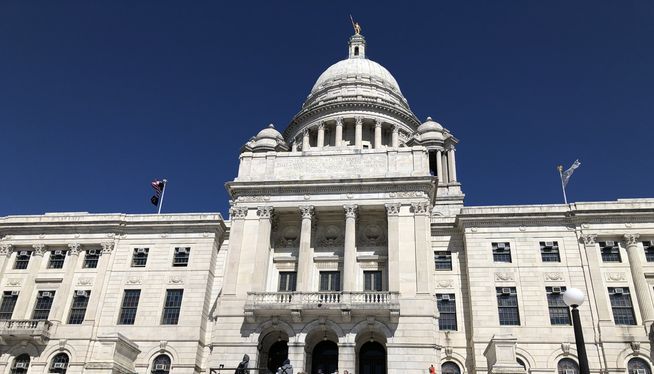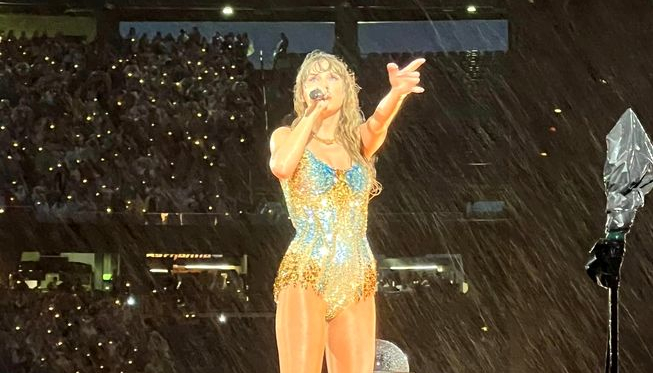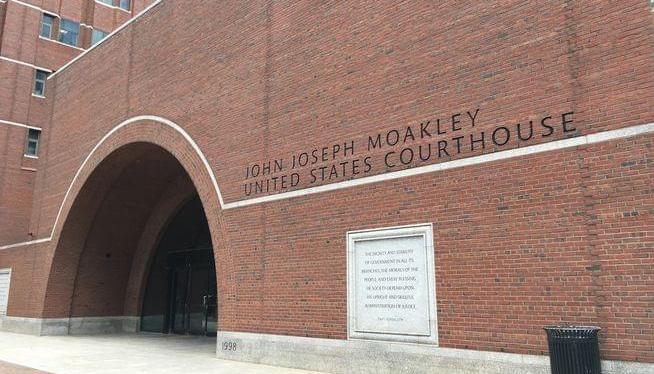
by Steve Klamkin WPRO News for ConvergenceRI
NEWPORT – The long tradition of political involvement and protest represented by the Newport Folk Festival is destined to survive, if the outlook of several young singer-songwriters who performed at the 2019 Newport Folk Festival is any sign.
Dozens of artists, from the well known to obscure, ranging from bluegrass and country, Americana to pop, reggae to indie rock, drew sell-out crowds over three solid days of music at Fort Adams.
Young singer-songwriters were thrilled to share the stage with headliners, who included Sheryl Crow, Brandi Carlile, Portugal. The Man, Judy Collins and surprise guest Dolly Parton.
Here are three portraits of the rising stars that performed and shared their stories.

Molly Tuttle
Just 26 years old, guitarist Molly Tuttle is a rising star in the bluegrass world. She performed a duo with Billy Strings, and joined the all-woman “The Collaboration” during Saturday night’s closing performance.
“It’s a really cool tradition, and I grew up with it because my dad’s a bluegrass musician,” Tuttle said. “It’s often passed down through people’s parents or grandparents. My grandpa’s a banjo player. But I think people gravitate towards it because there’s this strong community aspect, and there’s so many bluegrass festivals, and people sit out all night playing songs together, and it’s a really, really cool community of people.”
“In my music I write a lot about personal experiences,” Tuttle continued, “which I hope can just relate to other people’s experiences as well. A lot of my favorite writers write really personal songs and you think, ‘Wow, I didn’t know other people felt like that.’ So that’s kind of what I hope my music can do.”
Tuttle believes that songs can empower people and make people feel like that they can add a positive difference to the world. “So, yeah, I think a lot of people are striving to do that with their art,” she said.
“I grew up listening to Bob Dylan and Pete Seeger who wrote so many incredible protest songs and just social change songs,” Tuttle said. “and I’ve heard recordings of a lot of those songs played here at Newport, so I think there’s a rich history of that happening here, which I can definitely feel.”

J.S. Ondara
J.S. Ondara grew up in Nairobi, Kenya, and was a big fan of rock music, until he mistook a rock band’s cover version of an iconic folk song.
“I discovered folk music when I was in high school back home in Kenya and sort of made it a mission to move to America to try to make it as a folk singer,” Ondara explained. “About six years ago I made the move to Minnesota, Bob Dylan’s home. Bob Dylan’s sort of my conduit, my gateway drug into folk music. It felt like a fine thing to do, it’s a bit of a romantic thing, but I tend to be that way sometimes.”
“I was baffled, I sat there and listened to the ‘Freewheeling’ [Dylan’s 1963 second album, “The Freewheelin’ Bob Dylan”],” Ondara continued. “I was in an Internet café and went to investigate this song called “Knockin’ on Heaven’s Door,” because I thought it was a Guns ‘N Roses song, I made a bet with a friend, he said, ‘Oh yeah, it’s a Bob Dylan song.’”
“I was sitting there, and YouTube took me to ‘Freewheeling,’” Ondara said. “And I just sat there,” he said, stunned. ‘OK, what is this?’ It hit me. I just revisited it every day. Well, not every day, but instead of going to school, I would go to the Internet café.”
Now 27, Ondara was nattily dressed in a tan suit and fedora. He described his attraction to what he had heard on Dylan’s second album. “I think the storytelling aspect of it, and the sort of stripped down and very raw nature of it is something I hadn’t heard before. I was used to loud music, and I didn’t know that [such] music existed in the world, and was sort of blown away by it, really.”
“I’ve always liked to write when I was a kid,” Ondara said. “I felt very drawn to folk music because I felt it was tales and stories put to melody. It’s just finding inspiration from what’s around, and trying to write some sort of song from it.
Ondara said he often thinks about political issues, including immigration, when he writes his music. “Absolutely; because I am an immigrant, and I know a lot of people who are. I’ve been very fortunate to be able to make a career out of my stay here, and I know a lot of people who haven’t been as fortunate. With all the sort of growing intolerance toward immigration, I’m hoping to show through my path,” Ondara explained, “That there is something there, there is some sort of sliver of hope toward what the American Dream is, you know?”
Ondara said he remains optimistic. “I do, things are tough, but my life is some kind of example of what this country can offer and what it can do for more people. You know, I came here with nothing, just a dream. And despite all the trouble the country’s been going through and all the intolerance, I’ve been able to make a career out of it and I intend to continue to do that, so it makes me hopeful.”

Adia Victoria
Singer and songwriter Adia Victoria, who describes herself as a “young, black Southern woman,” is originally from South Carolina, now based in Nashville, where she’s been performing for seven years and touring for four.
“We’re so much more connected than we realize,” she said.
Victoria, 33, describes her sound as “gothic blues.”
“I’m a blues artist, and there’s a reason why the blues has endured the way that it has, because it speaks such universal truths of the human experience,” Victoria said. “At the same time while it does that, it also allows you to thumb your nose at the status quo. So, all the things that we’re supposed to be, all the things we’re supposed to care about, at the end of the day that don’t really know that, the blues knows that. So, it’s kind of able to deliver its art with a wink.
Victoria embraces the blues tradition as a blues artist. “I call myself a blues artist, more so from a philosophical standpoint,” she said. “I want to explore the parts of our human behavior that we’re not able to speak [about]. I want to speak the unspeakable and kind of rejoice in that. So that’s my heart of my music and my art, and the sound just kind of blooms from there.”
“I think all art is political, it’s all propaganda,” Victoria said.
“For me, I don’t consider it political, it’s just as much plainspoken and true. There’s certain pains that are inflicted on a lot of people that keep this machine going. That’s what I want to speak about is what the machine does to the human spirit.”
Edited by Richard Asinof













